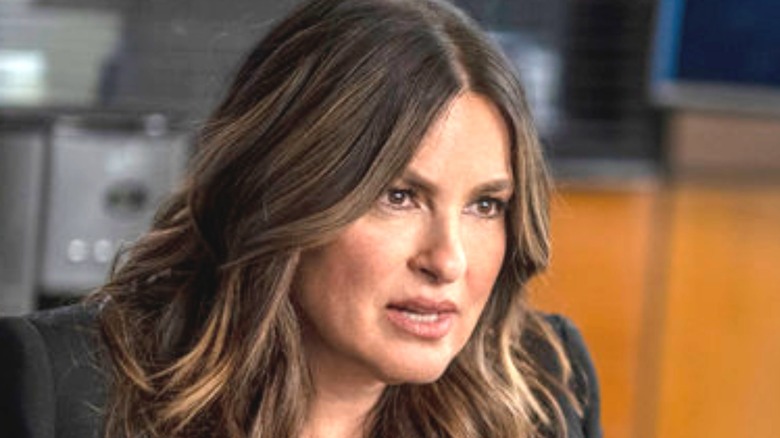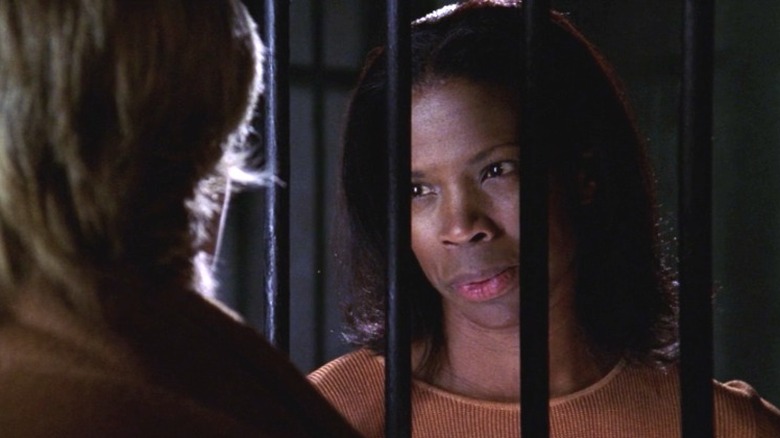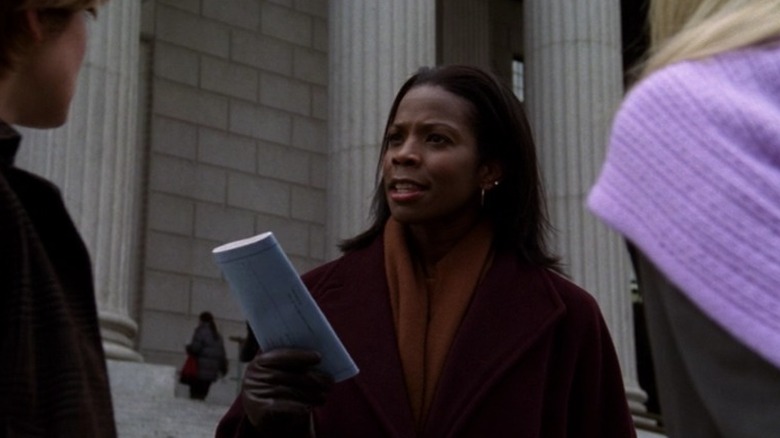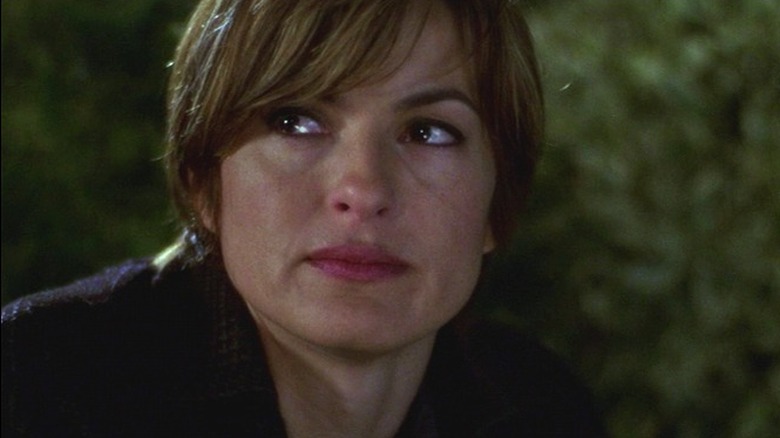Olivia Benson's Best Episode In Law & Order: SVU Season 4
It's easy to forget, after 23 seasons of character growth and development on "Law & Order: Special Victims Unit," that Mariska Hargitay's Captain Olivia Benson was once an up-and-coming detective with just as much to learn as any other member of the squad. Looking back over all that growth and development, it's equally easy to forget that in addition to her more iconic moments over the years (e.g., the times she went undercover or was "too close to the case"), Benson became who she is today through a series of quieter, less dramatic moments, as well.
One of those moments arrived late in Season 4, during a case in which Benson compels a rape victim (and the case's last viable witness) to testify in court, despite the fact that the specific circumstances of the trial mean the victim must undergo further trauma. Nearly 20 seasons later, fans have grown accustomed to the former detective and lieutenant's ability to put even the most hesitant victim at ease, to leaning on her so-called "whisper voice," and to doing all she can to protect the victim's well-being. In earlier seasons of the series, though, Benson was much more inclined to inadvertently push the victim away in her well-intentioned but too-enthusiastic attempt to get to the bottom of their story, coax them into a disclosure, or elicit their much-needed testimony.
In Episode 22 of Season 4 ("Futility"), Benson is forced to grapple with the often-disappointing emotional cost-benefit of her job as an SVU detective, and to question how much good she's actually doing.
In Season 4's Futility, Benson butts heads with a rape crisis counselor
"Futility" begins with the arrest of Michael Gardner (Fred Savage) a man accused of brutally assaulting and raping four women. Of the four, only his most recent victim, Carrie Huitt (Myndy Crist) can pick him out of a line-up and provide sufficient evidence for his indictment. When Gardner opts to represent himself at trial (after intimidating several witnesses and getting away with it) Carrie is reluctant to testify, but she is convinced to by both Benson and her rape counselor, Bethany Taylor (Tyra Ferrell, of "Boyz n the Hood"). After Gardner wins a motion to sever the four rape charges (three of which can't go through without the evidence from Carrie's) her testimony becomes even more important.
In court, Gardner focuses his cross-examination of Carrie on the line-up. He insists that Benson told Bethany to tell Carrie to pick him out, and subsequently subpoenas the records of Carrie's private conversation with her counselor. The judge won't allow the records to be read in open court, but rules that the conversation be included in evidence. Understandably, Bethany refuses to break her client's privilege, even for the judge, and is held in contempt. In order to move forward with the case, Benson pressures Carrie to waive her right to privacy, believing it's now the only way to put Gardner away for good. Here, of course, is where things take a turn for the worse.
Benson helps win the trial, at the cost of losing the war
After Carrie waives her right, and Bethany is forced to share their conversation with the judge, a man who raped another of the counselor's clients subpoenas the records from their conversation. Just as Bethany warned, the move set a dangerous president with regard to the sanctity of a rape counselor's private meetings. Infuriated, Bethany tells Benson that she'd be "the perfect person to bully (her other client) into waiving her rights." Though Benson insists she did what she had to do to stop Gardner from raping any more women, her conviction waivers when Bethany tells her six of her clients have stopped seeing her, for fear their conversations will be used as evidence.
In a heart-to-heart with Stabler (Christopher Meloni), Benson confesses that she thinks she made things worse, despite his reassurances that she did her job. "I made Carrie relive the worst thing that's ever happened to her," she tells him, adding that she "screwed any number of victims who might have sought counseling from Bethany Taylor," and that "a few less rapes may be reported because of it." For the first, but by no means the last, time in the series, the detective is forced to confront the often tragically unjust mechanics of the justice system, particularly with regard to victims of rape. What's more, her conversation lays the foundation for the character she'll ultimately become, and foreshadows an ongoing theme.
Benson questions the purpose of her job in Season 4, Episode 22
In what will become an oft-relied upon theme in "Special Victims Unit," Benson is torn between the conflicting nature of "doing her job" and "doing what's right," and begins to realize that the latter is not the black-and-white crusade she once thought. Her emotional conversation with Stabler about that conflict might well be one of the most character defining moments in all of the series. "You've always identified with the victims," he tells her, theorizing that maybe it's because she's a woman, but that regardless, it's "one of the things that makes (her) a great cop" — and one of the things that makes the job harder on her than others.
Olivia Benson's staunch belief in, support of, and ability to relate to the victims is one of her defining traits, if not the defining trait of her character. The scene ends with her wondering if the cost is worth it, when there's always another rapist or another abuser somewhere. Again, this isn't the last time the character doubts her ability to manage the Sisyphean task before her, but it is the first time she so openly questions her own convictions. (It's also the first time, as a fan on Reddit pointed out, that she uses her characteristic "whisper" voice). Benson's hard-earned ability to take a step back and weigh the options before her, even if it means questioning herself, is part of what makes her the leader that fans have come to know and love in the series' 23rd season — and it all began in Season 4, Episode 22.
If you or anyone you know has been a victim of sexual assault, help is available. Visit the Rape, Abuse & Incest National Network website or contact RAINN's National Helpline at 1-800-656-HOPE (4673).



